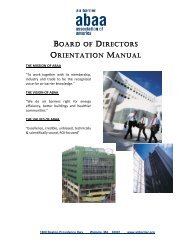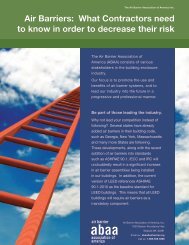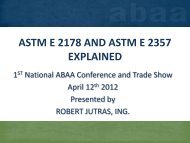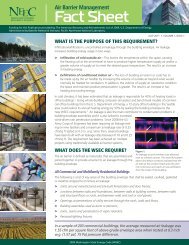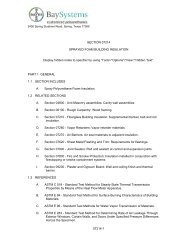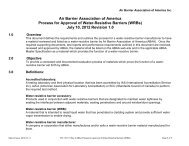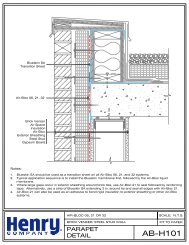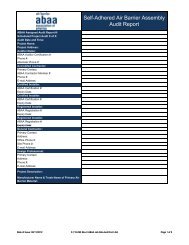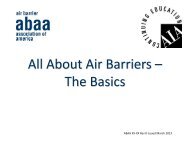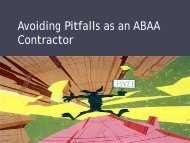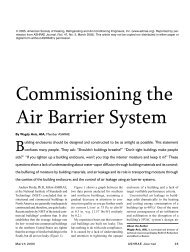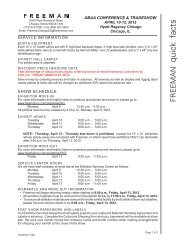ABAA Contractor Accreditation Why and How? - Air Barrier ...
ABAA Contractor Accreditation Why and How? - Air Barrier ...
ABAA Contractor Accreditation Why and How? - Air Barrier ...
- No tags were found...
Create successful ePaper yourself
Turn your PDF publications into a flip-book with our unique Google optimized e-Paper software.
The <strong>Air</strong> <strong>Barrier</strong> Association of America Inc.<strong>ABAA</strong> <strong>Contractor</strong><strong>Accreditation</strong><strong>Why</strong> <strong>and</strong> <strong>How</strong>?The <strong>Air</strong> <strong>Barrier</strong> Associationof America (<strong>ABAA</strong>) consistsprimarily of stakeholders in thebuilding enclosure industry.<strong>ABAA</strong> is focused on leadingthe industry into the futurein a progressive <strong>and</strong>professional manner.
<strong>Why</strong> become an <strong>ABAA</strong> Accredited <strong>Contractor</strong>?Overview of the <strong>Air</strong> <strong>Barrier</strong> Association of AmericaThe <strong>Air</strong> <strong>Barrier</strong> Association of America (<strong>ABAA</strong>) was incorporated in the State of Massachusettsin 2001 <strong>and</strong> consists primarily of stakeholders in the building enclosure industry. <strong>ABAA</strong> isfocused on leading the industry into the future in a progressive <strong>and</strong> professional manner.Overview of the Quality Assurance Program (QAP)MISSION: Develop a professional air barrier industry dedicated to installingeffective air barrier systems.• Program based upon principles of ISO 9000• Industry funded, volunteer program• Specified by owners or architects in their project specifications• Risk management• <strong>ABAA</strong> specified projects in over 30 U.S. states <strong>and</strong> countingKey components include:• Research <strong>and</strong> development• St<strong>and</strong>ards <strong>and</strong> specifications• Manufacturer evaluated products• <strong>Contractor</strong> accreditation• Training <strong>and</strong> education• Documentation• 3rd party field audits• Site testing• Database tracking• Appeal process• Certification of installersAccredited <strong>Contractor</strong> Benefits<strong>ABAA</strong> promotes our accredited contractors to design professionals across America.We encourage the professional community to adopt the <strong>ABAA</strong> Quality Assurance Program<strong>and</strong> specify the <strong>ABAA</strong> accredited contractors in all air barrier projects.• Compete on a level playing field• Bid <strong>and</strong> work on projects specified to utilize <strong>ABAA</strong> Accredited <strong>Contractor</strong>s<strong>and</strong> the <strong>ABAA</strong> Quality Assurance Program• Help reduce call-backs• Help reduce liability <strong>and</strong> subsequent related costs• Website listing as accredited contractor• Be promoted as one of the premier air barrier contractors to building owners<strong>and</strong> the professional community
<strong>How</strong> to become an <strong>ABAA</strong> Accredited <strong>Contractor</strong>?<strong>Contractor</strong> Requirements1. Join <strong>ABAA</strong> as a contractor member <strong>and</strong> pay membership fee ($1,000)2. Apply to become an Accredited <strong>Contractor</strong> by submitting a <strong>Contractor</strong> Application Form3. Pay accreditation fee ($700)4. Employ an <strong>ABAA</strong> Level 3 Certified Installer*5. Minimum $2,000,000 in Commercial General Liability6. Provide evidence of bonding ability of at least $300,0007. Have one individual attend a QAP administration training program ($195)8. Sign Accredited <strong>Contractor</strong> Licensing Agreement* An <strong>ABAA</strong> Level 3 Certified Installer has attended an <strong>ABAA</strong> Installer Certification Training course <strong>and</strong> has successfully passed thewritten test including the Plans & Specs section. They have a minimum 3,000 hours of air barrier field installation or related tradeexperience. They can supervise up to 5 employees <strong>and</strong> must be present on the job site at all times when the air barrier materialis being installed on an <strong>ABAA</strong> specified project.Installer RequirementsPrequalification:Have at least 3000 hours of air barrier field installation experience OR related trade experience.Related trade experience can be experience installing spray insulations, spray waterproofing,painting, sheet membranes, torch applied membranes, damp proofing, flashing, etc.1. Attend an <strong>ABAA</strong> training program in the product you wish to become certified in– 3 day course2. Write a written test <strong>and</strong> achieve an overall average of 80% <strong>and</strong> no less than 65%in any core section (Level 3’s must complete the Plans & Specs section)3. Submit the Installer Certification Application <strong>and</strong> submit registration payment ($250)4. Submit signed Affidavit indicating field experience5. Sign a Certification Licensing Agreement
Related Costs to Participate in ProgramInitial CostsItemCostAssociation Membership $1,000<strong>Contractor</strong> <strong>Accreditation</strong> Fee $700Installer Initial Certification Fee $250Training Related Costs:QAP Administrator $195Spray Foam / Self-Adhered MembraneInstaller 3 Day Program $995Liquid Membrane / Self-AdheredMembrane Installer 3 Day Program $995Yearly Renewal CostsAssociation Membership $1,000<strong>Contractor</strong> <strong>Accreditation</strong> Fee $700Installer Certification Renewal Fee $100Project Related Fees for <strong>ABAA</strong> QAP ProjectsWhen bidding on <strong>ABAA</strong> QAP Projects <strong>and</strong> to be included in bid price:ItemIndustry Development Fund3rd Party Site Audits* $0.085 / sq. ft. of the total air barrier material installed.Cost$0.085 / sq. ft*$2,000 (flat rate)NOTES: The Industry Development Fund is used to administer the Quality Assurance Program <strong>and</strong> to furtherthe industry. You only pay these fees when you are working on an <strong>ABAA</strong> specified project.The audit cost is a flat rate <strong>and</strong> <strong>ABAA</strong> subsidizes the cost of the audit should the actual cost be over $2000.The number of audits required for a project is based on the total square footage of the air barrier materialapplied on an <strong>ABAA</strong> specified project. If the architect specifies a different amount of audits in the specification,that amount is to be followed, unless it is below the minimum as identified in the table below.Required Site Audits are calculated as follows:Square Footage of ProjectNo. of AuditsUp to 10,000 110,001 to 35,000 235,001 to 75,000 375,001 to 125,000 4125,001 to 200,000 5200,001 <strong>and</strong> over 6IDF <strong>and</strong> Audit costs are notapplicable for non-<strong>ABAA</strong> specifiedair barrier projects. You only paythese fees when working on an<strong>ABAA</strong> specified project.For more information visit our web site or email us:abaa@airbarrier.orgwww.airbarrier.orgPrices subject to change.<strong>ABAA</strong> 115-70 Rev 2



